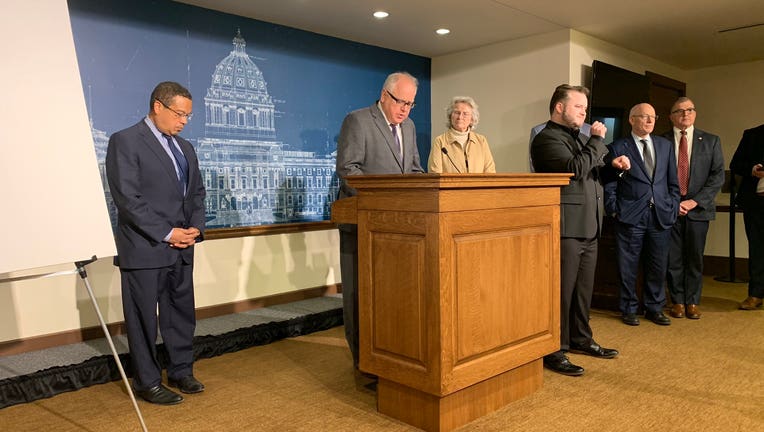Walz declares peacetime emergency, wants big gatherings canceled

ST. PAUL, Minn. (FOX 9) - Minnesota Gov. Tim Walz declared a peacetime state of emergency Friday and urged people to cancel large gatherings and practice social distancing as the number of confirmed cases of coronavirus in Minnesota rose to 14.
Yet Walz stopped short of canceling schools statewide, going against several Midwestern states that have all called off classes over the past 24 hours.

Minnesota governor declares COVID-19 state of emergency
Minnesota Gov. Tim Walz signed an executive order Friday declaring a peacetime state of emergency as the number of confirmed cases of COVID-19 in the state rose to 14.
“Minnesotans – just like Americans across the country – need to prepare for some significant disruptions,” Walz told reporters packed into the state Capitol’s cramped basement news conference room to hear his decision.
Walz recommended:
• Event organizers cancel or postpone gatherings with 250 or more people, including concerts, conferences, professional and amateur performances or sporting events.
• Event organizers cancel or postpone smaller events held in settings that do not allow social distancing of 6 feet per person.
• Event organizers limit attendance to no more than 10 people for events where the majority of participants are at higher risk for severe illness from COVID-19.
• People and families at higher risk of severe COVID-19 illness stay at home and avoid travel.
• Employers make telework arrangements for workers whose duties can be done remotely.
• Employers stagger work schedules and limit non-essential work travel.
• Health care facilities and assisted-living facilities more strictly limit visitors.
• Faith-based organizations offer video or audio events.
• Hospitals and other health care facilities implement triage before entering facilities.
Related
Coronavirus in Minnesota: 14 confirmed cases of COVID-19 as of Friday
Minnesota now has 14 confirmed cases of the new coronavirus in the state. Five new cases were confirmed as of Friday.
The recommendations to avoid mass gatherings do not pertain to many places, including grocery stores, airports, public transportation, and workplaces. Walz did not order any restrictions, but Health Commissioner Jan Malcolm said the governor’s peacetime emergency declaration would allow him to do so.
“If we need to make these things mandates, the governor would have the power to do that,” she said.
The Minnesota State Capitol remains open, but Walz said the recommendation against gatherings of more than 250 people applies to the Capitol.

MDH not recommending K-12 schools to close
The Minnesota Department of Health is not recommending K-12 schools to close for now.
K-12 schools remain open
Walz and Malcolm defended their decision not to cancel school statewide, as other governors have done. The transmission rate in children is “very, very low,” Malcolm said. School closures in other counties have not significantly slowed the spread of coronavirus, she said.
Walz acknowledged it was a tough decision and said parents should prepare in case schools are eventually shuttered.
“We’re struggling with the hard (decisions) because I can tell you we’re hearing overwhelmingly on both sides of, ‘close schools, don’t close schools,” the governor said. “I am gathering all that best information around us and we will make real-time decisions around that.”
In the past day, Michigan, Illinois, South Dakota and Wisconsin all canceled classes statewide.
Travel plans uncertain
With spring break approaching, the virus has put families’ travel plans in limbo.
Older people with underlying health conditions should not travel, Malcolm said. For others, it’s a personal choice because the Centers for Disease Control has not yet recommended against domestic travel, she said.
“We’re just encouraging people to be thoughtful – if trips could be postponed, out of an abundance of caution,” Malcolm said.
Walz said he had been planning to take his son and a friend to Disney World in Florida before the massive theme park closed because of the coronavirus.
Lawmakers called to action
The first-term Democratic governor has been meeting regularly with legislative leaders, who are planning to continue on with the legislative session despite virus fears.
Walz said lawmakers should vote to expand sick pay requirements, guarantee free coronavirus testing to Minnesotans, and create a grant and loan program for the state’s hospitals to cover unforeseen costs.
Senate Majority Leader Paul Gazelka said in a news conference Friday afternoon that he would consider the proposals but did not indicate immediate support for any of them.
“We’re listening to what CDC is talking about, and our health care professionals, as far as their needs and focusing on their resources. We’re not focused on new policies at this point,” Gazelka said.
State health officials have tested 555 people in Minnesota for coronavirus but acknowledged they were frustrated by a limited testing capacity.
Malcolm said the state has asked the federal government for the capacity to test 15,000 people a month, or roughly 500 a day. Walz said he spoke about the issue with Vice President Mike Pence this week.


